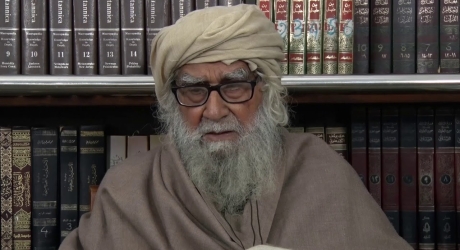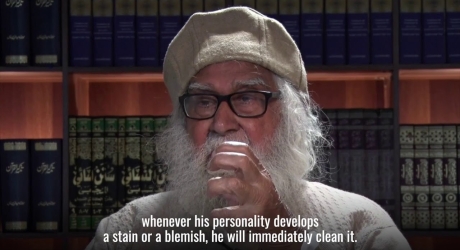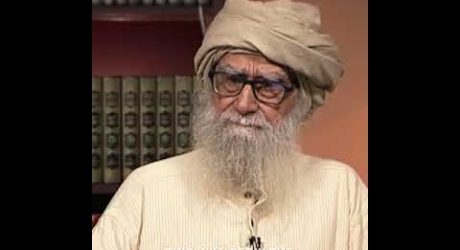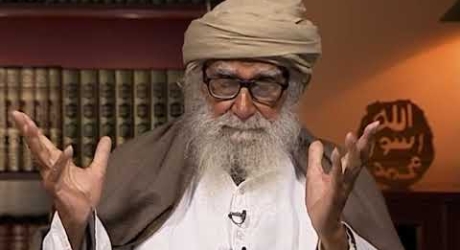One of the Quranic teachings is Tauba, which means repentance. When you make a mistake and do Tauba, the blessing of God will return to you. In the chapter Al-Tahrim (Prohibition), the Quran says: O believers, turn to God in sincere repentance, hoping that your Lord will forgive you your evil deeds and admit you into gardens watered by running streams. (66:8) In this verse, the Quran declares that after engaging in genuine Tauba, one who has erred will be unburdened of the effect of his evil deeds. What is most important about this is that the wrong-doer will be forgiven by God and consequently be rewarded with Paradise in the hereafter. This divine blessing is not confined to the next world; it also includes the present world in the extended sense. Family life and social life will also be blessed with the fruits of Tauba. In family life as well as social life, untoward events are unavoidable. Such happenings sour relations and create a distance between people. The best solution is Tauba. Do not wait for others to take the lead. Instead, you can come forward and say without hesitation: “I am sorry, I was wrong.” This is the only way of maintaining normalcy among relatives, friends, acquaintances and even strangers. Tauba is an instrument of self-correction, initiating a process of self re-assessment. This process is vital as it enhances your intellectual calibre and increases your capacity for analysis. This, in turn, leads to spiritual development.
Self-correction
Self-correction is very important. One who does not possess this quality can end up in destruction. There are certain things that are called living creatures. They have the quality to grow. For example, the stone does not grow, however living creatures such as tree, animals, human beings grow. Because, of this growth a problem arises. Unchecked growth can lead to problems. For example, trees are pruned. The pruning process is an integral part of living creatures. Therefore, the pruning process is used to check the growth of trees, so that they can grow in the right way. Same is the case with man. Growth in man becomes unchecked for several reasons. Example, nails if not cut grow more than normal. The pruning process is of two types. One is physical pruning and the other is psychological pruning. When you cut your nails or hair, that is physical pruning. Similarly, your thoughts, habits, if, remain unchecked, become a serious problem.
A verse from the Quran is relevant in this regard: “But God undertakes to accept repentance only from those who do evil out of ignorance and those who repent soon after. God turns towards such people with mercy; He is all knowing and all wise.” (4:17) Those who make mistakes, and then immediately repent are forgiven. So, speedy tawbah or speedy repentance is acceptable to God. Tawbah-e-qareeb (speedy repentance) is different from tawbah-e-baeed (late repentance). The former is acceptable to God, while the latter is very risky. What is tawbah-e-qareeb? I understood this through study of psychology. It is related to psychological pruning.
When you make a mistake and do not repent instantly, then slowly you get conditioned in that mistake. When you become conditioned in that mistake, then reform becomes difficult. Thus, the concept of tawbah-e-qareeb is very meaningful here. If you do not do speedy tawbah, then according to the law of nature conditioning begins. Your case become one of conditioning. Tawbah-e-qareeb is a warning. Man always commits mistakes. To err is human. But, what is required is to immediately become conscious of the mistake and correct yourself. If you do not do so, then you take the risk of becoming conditioned in that mistake.
Moreover, every mistake has a small beginning. For example, when you drink alcohol or smoke cigarette you begin by simply taking a taste of it. Then one becomes habitual to it. One becomes habitual of other things such as politics, entertainment culture and so on in this same manner.
Recently, I came to know of a passage from Bertrand Russell's biography. He says that he studied throughout his life. Toward the end, study became a habit for him. Then he says that when he reached the final days of his life, he felt that there was no purpose in life. If you something out of habit, then your thinking process remains halted. Because, you are doing something out of habit and not out of thinking.
Habit kills the thinking process. Habit of anything, be it kite-flying or talking incessantly or eating tasty food or engaging in political talk, ceases your thinking process. This is what happened with Russell: he kept studying but his thinking process remained undeveloped.
There are four phases to the development of habit. First, when one initiates something he starts by taking taste of it. Some people develop the habit of making up things and whenever they meet a person they talk in this manner. In the beginning you only develop the taste for something. It is important here to check yourself here. Because, if something gives you taste then it can develop into a habit, so you must check on it so that it doesn't spiral into a habit. First comes taste, then comes habit and then comes addiction. Lastly, you reach the point of no return. These are the four phases.
Any habit that swallows up your time or distracts you or becomes your obsession is a bad habit and must be shunned. Whatever you take up in life should be your well-considered decision rather than a mere habit. If you do something through consideration it will be fruitful, otherwise not. First of all, you develop a taste for something. If you see that it is giving you taste, then immediately understand that you have entered a different phase. Some people develop the habit of shopping, speaking a lot, spending excessive time with children, and so on. These habits gradually swallow up a person.
When I was young I went to a doctor for constipation. The doctor asked me to smoke cigarette. When I had smoked few cigarettes I realized that I was slowly becoming habitual of it. So I immediately threw away the rest of the cigarettes. It is wisdom to of life to think about something if it is giving you taste. You should then and there ponder and reflect whether or not it is good for your life. If it is not good, then do tawbah-e-qareeb, or speedy return. If you do not do this, then that thing will first enter your life as a taste. If you do not leave it here, it will become a habit. Then it will turn into addiction and a point will be reached when you will not be able to return.
Tawbah-e-qareeb means speedy repentance. Because, if you delay in repenting for a mistake, then repenting itself becomes impossible as later you will not be able to abandon the mistake you are engaged in it. Tawbah-e-qareeb is very meaningful as if you do not do tawbah-e-qareeb, then tawbah-e-baeed will also become impossible.
You cannot change your nature. You can only manage your nature. That is, if you expect to not get conditioned in something you are engaged in, then that is not possible. You will surely get conditioned, so you have to check your habits. People know only of physical pruning, for example cutting of nails or hair. But people are unaware of psychological pruning.
Habit may not only be a physical habit, it can also be a psychological habit. The Quran says: “Lest your actions come to nothing without your realizing it.” (49:2) That is, you do not get the reward of your deeds and you may not even know. This happens by developing habit of something, because then the consciousness of right and wrong in that matter is reduced. When you start something bad, you will know that it is wrong, but when you get addicted to it, you fail to see that it is wrong. Thus, you remain engaged in that bad deed without even realizing that it is bad. Thus, you are unaware of being involved in something bad, and in this way all the good deeds you do also do will not be rewarded.
All parents pamper their children. This slowly ruins the child as he develops bad habits, wastes money and time and refuses to listen to his parents. Initially, pampering the child seems good. But, you fail to see its long-term result and thus you develop the habit of pampering the child. However, this very thing ruins the child and in turn the parents also destroy their health after their ruined children. So, you have to check the habit of pampering children right from the beginning.
Anything can give you addiction. To develop right way of thinking, you have to become your own guardian. You should adopt the principle of tawbah-e-qareeb rather than think of doing tawbah-e-baeed. If you do not repent speedily, then slowly your sensitivity dies out. A time comes when you become insensitive. You will know that you have made a mistake but you will be insensitive toward it. In this world, there is option only for tawbah-e-qareeb for man. There is no option for tawbah-e-baeed, as until then your sensitivity goes away and so you cannot repent at all. You can reform yourself only soon after making the mistake, and no after a long time.
There are four big phases of developing a habit. First is when you get taste of something. You should think then that you have to do something as duty and not for taste. Because, if you start doing something for taste then it will never stop. For example, if you look after your child as a responsibility then it will be alright. But if you start loving and pampering your children as you get taste from it, then it will not cease and ultimately your child will get ruined.
We have got very little time to work in this life. The average age of a person is about seventy years. If you remove the childhood years and the time of maturity from this average age, then you get much less years to do some substantial work in life. Thus, a person should be very serious about himself. People speak about and blame others on stage or in writing; but people are unaware of their own shortcomings. No one focuses on the personality that he is developing within himself. No one talks about self-correction or introspection.
Everyone of you should introspect himself and continuously watch over himself, otherwise you will not be able to play your role in the mission. To continue with your mission, you have to introspect yourself and check yourself continually.
Questions and Answers
Q1. Pruning every habit, many of which are not wrong or unlawful, makes life dull and devoid of interest. Please comment.
A1. If you do anything out of habit, even if it be good, it is wrong. For example studying is good, but when Russell did it as a habit, his thinking process stopped. Doing anything as a habit is wrong, we have to do everything by way of conscious reasoning. Some habits are unlawful, for example, drinking alcohol. But some habits are ghair-muharram haram (A thing that is unlawful although it has not been declared as unlawful).
Q2. Is there any habit that should be adopted by all?
A2. Nothing should be done as a habit. If you read namaz as a habit there will not be any use if it. There is value of praying only if you do it consciously and not as a habit. According to a Hadith, a person is rewarded in proportion to the consciousness of his deed. (Tabarani) God sees a person's taqwa, and not the quantity of worship. God does not see the quantity of the work done, but the quality it has.
Q3. Why do we need to divest ourselves from worldly attachment to establish contact with God?
A3. Worldly attachments are distractions in the way of remembering God. To continually think on God, we need to purge ourselves of distractions. Man has to be very focused in this matter, otherwise his mind will get diverted.
Q4. Is there some special way for doing tawbah-e-qareeb?
A4. It is an intellectual task, there is no physical way of doing tawbah-e-qareeb. But, one must repent instantly as afterwards there is no possibility for repenting.
Q5. How should we raise our children so that they do not become victims of wrong belief?
A5. There are only two things parents need to do for children: Do not pamper them and encourage them to study.
Q6. If someone is in the stage of addiction of a habit, what should he do?
A6. One has to do merciless hammering in order to get over addiction. No simple way is effective in this matter.
Q7. What is the importance of personal training over distribution of literature?
A7. Distributing literature is very important. One should not judge the result by seeing the masses. Result has to be judged by keeping individual as the criterion. Distribution will not change the masses, only some individuals or seekers will develop change in them through the literature. For example, during the Kashmir Meet at CPS, a person told his story. He was earlier a militant. He once saw pieces of a pamphlet strewn on the roadside. He took it home and joined it together. The pamphlet was Creation Plan of God, published from here. The person read it and realized that he was wrong and thus abandoned militancy. So, reform has to be seen at individual level and not mass level. If you see things from mass level, then you will belittle even the task performed by the prophets.
Q8. What is the relationship between introspection and tazkiya?
A8. Introspection precedes tazkiya (purification of personality). Both are interconnected.
Q9. How to rationally identify our weaknesses?
A9. This matter is related to becoming deserving of Paradise. According to a Hadith, entry to Paradise can be gained only by paying a heavy price. Thus, we have to do merciless self-hammering as the price for this becoming deserving of Paradise.
Q10. What is role of silence when one is angry? Does it make the other party feel you are weak?
A10. That silence makes you weak is nothing but a false notion. Muslims today are not ready to remain silent and thus are destroying themselves everywhere. Thus, not remaining silent can be judged from the counterproductive results it has yielded. For example, riots in India happen only because Muslims are not willing to remain silent and instead take action. Muslims, therefore, need to reassess their policy. They must follow the principle of remaining silent. This principle has been followed only in our mission.










